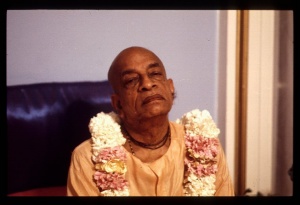SB 5.4.13: Difference between revisions
m (1 revision(s)) |
No edit summary |
||
| Line 1: | Line 1: | ||
{{info | {{info | ||
|speaker= | |speaker=Śukadeva Gosvāmī | ||
|listener=King | |listener=King Parīkṣit | ||
}} | }} | ||
[[Category:Srimad-Bhagavatam - Canto 05 Chapter 04]] | |||
[[Category:Bhagavatam Verses Spoken by Sukadeva Gosvami - Vanisource|050413]] | |||
<div style="float:left">'''[[Srimad-Bhagavatam]] - [[SB 5|Fifth Canto]] - [[SB 5.4: The Characteristics of Rsabhadeva, the Supreme Personality of Godhead|Chapter 4: The Characteristics of Ṛṣabhadeva, the Supreme Personality of Godhead]]'''</div> | |||
<div style="float:right">[[File:Go-previous.png|link=SB 5.4.11-12]] '''[[SB 5.4.11-12]] - [[SB 5.4.14]]''' [[File:Go-next.png|link=SB 5.4.14]]</div> | |||
{{RandomImage}} | |||
==== TEXT 13 ==== | ==== TEXT 13 ==== | ||
<div class="verse"> | |||
<div | :yavīyāṁsa ekāśītir jāyanteyāḥ pitur ādeśakarā | ||
yavīyāṁsa ekāśītir jāyanteyāḥ pitur ādeśakarā mahā-śālīnā mahā-śrotriyā yajña-śīlāḥ karma-viśuddhā brāhmaṇā babhūvuḥ | :mahā-śālīnā mahā-śrotriyā yajña-śīlāḥ | ||
:karma-viśuddhā brāhmaṇā babhūvuḥ | |||
</div> | </div> | ||
| Line 14: | Line 21: | ||
==== SYNONYMS ==== | ==== SYNONYMS ==== | ||
<div class="synonyms"> | |||
<div | ''yavīyāṁsaḥ''—younger; ''ekāśītiḥ''—numbering eighty-one; ''jāyanteyāḥ''—the sons of Jayantī, the wife of Ṛṣabhadeva; ''pituḥ''—of their father; ''ādeśakarāḥ''—following the order; ''mahā-śālīnāḥ''—well behaved. well cultured; ''mahā-śrotriyāḥ''—extremely learned in Vedic knowledge; ''yajña-śīlāḥ''—expert in performing ritualistic ceremonies; ''karma-viśuddhāḥ''—very pure in their activities; ''brāhmaṇāḥ''—qualified brāhmaṇas; ''babhūvuḥ''—became. | ||
</div> | </div> | ||
| Line 22: | Line 28: | ||
==== TRANSLATION ==== | ==== TRANSLATION ==== | ||
<div class="translation"> | |||
<div | |||
In addition to these nineteen sons mentioned above, there were eighty-one younger ones, all born of Ṛṣabhadeva and Jayantī. According to the order of their father, they became well cultured, well behaved, very pure in their activities and expert in Vedic knowledge and the performance of Vedic rituals. Thus they all became perfectly qualified brāhmaṇas. | In addition to these nineteen sons mentioned above, there were eighty-one younger ones, all born of Ṛṣabhadeva and Jayantī. According to the order of their father, they became well cultured, well behaved, very pure in their activities and expert in Vedic knowledge and the performance of Vedic rituals. Thus they all became perfectly qualified brāhmaṇas. | ||
</div> | </div> | ||
| Line 29: | Line 34: | ||
==== PURPORT ==== | ==== PURPORT ==== | ||
<div class="purport"> | |||
From this verse we have good information of how the castes are qualified according to quality and work. Ṛṣabhadeva, a king, was certainly a ''kṣatriya''. He had a hundred sons, and out of these, ten were engaged as ''kṣatriyas'' and ruled the planet. Nine sons became good preachers of ''Śrīmad-Bhāgavatam (mahā-bhāgavatas),'' and this indicates that they were above the position of ''brāhmaṇas''. The other eighty-one sons became highly qualified ''brāhmaṇas''. These are some practical examples of how one can become fit for a certain type of activity by qualification, not by birth. All the sons of Mahārāja Ṛṣabhadeva were ''kṣatriyas'' by birth, but by quality some of them became ''kṣatriyas'', and some became ''brāhmaṇas''. Nine became preachers of ''Śrīmad-Bhāgavatam (bhāgavata-dharma-darśanāḥ''), which means that they were above the categories of ''kṣatriya'' and ''brāhmaṇa''. | |||
</div> | |||
<div | <div style="float:right; clear:both;">[[File:Go-previous.png|link=SB 5.4.11-12]] '''[[SB 5.4.11-12]] - [[SB 5.4.14]]''' [[File:Go-next.png|link=SB 5.4.14]]</div> | ||
__NOTOC__ | |||
</div> | __NOEDITSECTION__ | ||
__NOTOC__ | |||
Revision as of 04:28, 9 May 2021

A.C. Bhaktivedanta Swami Prabhupada
TEXT 13
- yavīyāṁsa ekāśītir jāyanteyāḥ pitur ādeśakarā
- mahā-śālīnā mahā-śrotriyā yajña-śīlāḥ
- karma-viśuddhā brāhmaṇā babhūvuḥ
SYNONYMS
yavīyāṁsaḥ—younger; ekāśītiḥ—numbering eighty-one; jāyanteyāḥ—the sons of Jayantī, the wife of Ṛṣabhadeva; pituḥ—of their father; ādeśakarāḥ—following the order; mahā-śālīnāḥ—well behaved. well cultured; mahā-śrotriyāḥ—extremely learned in Vedic knowledge; yajña-śīlāḥ—expert in performing ritualistic ceremonies; karma-viśuddhāḥ—very pure in their activities; brāhmaṇāḥ—qualified brāhmaṇas; babhūvuḥ—became.
TRANSLATION
In addition to these nineteen sons mentioned above, there were eighty-one younger ones, all born of Ṛṣabhadeva and Jayantī. According to the order of their father, they became well cultured, well behaved, very pure in their activities and expert in Vedic knowledge and the performance of Vedic rituals. Thus they all became perfectly qualified brāhmaṇas.
PURPORT
From this verse we have good information of how the castes are qualified according to quality and work. Ṛṣabhadeva, a king, was certainly a kṣatriya. He had a hundred sons, and out of these, ten were engaged as kṣatriyas and ruled the planet. Nine sons became good preachers of Śrīmad-Bhāgavatam (mahā-bhāgavatas), and this indicates that they were above the position of brāhmaṇas. The other eighty-one sons became highly qualified brāhmaṇas. These are some practical examples of how one can become fit for a certain type of activity by qualification, not by birth. All the sons of Mahārāja Ṛṣabhadeva were kṣatriyas by birth, but by quality some of them became kṣatriyas, and some became brāhmaṇas. Nine became preachers of Śrīmad-Bhāgavatam (bhāgavata-dharma-darśanāḥ), which means that they were above the categories of kṣatriya and brāhmaṇa.